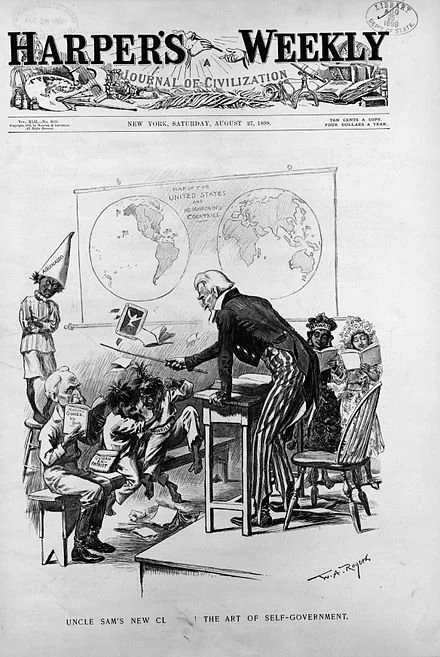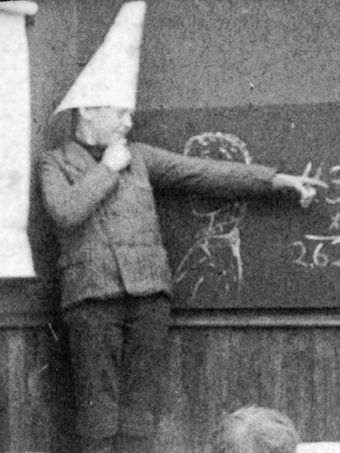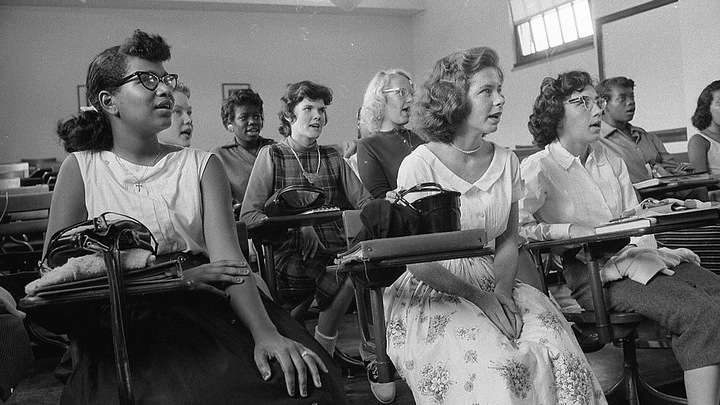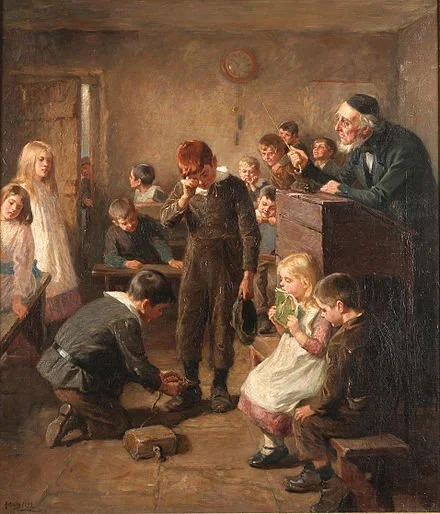
Chris Powell: More discipline would mean less racism in schools
Harper's Weekly cover from 1898 shows a caricature of school discipline.
MANCHESTER, Conn.
Cromwell, Conn., lately has been convulsing over a student's at-first anonymous public complaints about racist or abusive conduct by other students in school.
What was the first action taken in response by the school administration and the town's Board of Education? Of course it was to hire a consultant -- an expert in "diversity, equity, and inclusion."
Cromwell's school officials may have been surprised to discover that children can be bratty and even vicious quite apart from anything related to "diversity, equity, and inclusion." Any personal characteristics can be targeted by childish brattiness and viciousness. Race is just one of many such opportunities.
Nobody who has spent time with children needs a "diversity, equity, and inclusion" consultant to know that. But such a consultant will just help school officials look sincere.
If school officials were ever really sincere about misbehavior by students, instead of hiring a consultant they might make it a practice to have every student interviewed confidentially every month by a teacher, administrator, or guidance counselor and asked about any problems they were having in school. At these interviews students would be instructed in or reminded of the necessity of decent behavior and the penalties for misconduct.
Each meeting would be summarized in writing by the interviewer and the student would be invited to add his own comment before both acknowledged the summary in writing and the summary was placed in the student's file. Specific complaints by a student would be promptly investigated. Due process would be provided and formal judgment issued, and upon any finding of misconduct, punishment imposed on the perpetrator.
Schools in Connecticut have a miserable reputation on their response to bullying, perhaps because discipline in school has become politically incorrect, which may be the precursor to much of the racism and misconduct being complained about lately.
But the problem of bratty and vicious kids and ineffective school administration is an old one, and the General Assembly may be even more oblivious to it than Cromwell seems to be.
After testimony from parents, teachers, psychiatrists, and others about hateful conduct among school children, the legislature's Committee on Children recently proposed legislation to appoint a "task force" to study it. Apparently the need for more discipline in school has not occurred to the committee.
Some Democratic legislators have soared beyond obliviousness on the issue. They have proposed legislation to prohibit colleges and universities from questioning applicants about any criminal records and discipline for misconduct in high school. That's the Democratic Party's approach to crime generally these days: to conceal it in support of claims that crime is down as society disintegrates.
One hardly needs to consult an expert in "diversity, equity, and inclusion" to figure out what will happen when word reaches high school students about the law forbidding colleges and universities from questioning applicants about their misconduct. Misconduct will be liberated.
It's still early in the legislative session and craziness like the college legislation may be weeded out. But given the legislature's far-left Democratic majority, it's just as likely that the college legislation will be amended to impose fines and prison time on any admissions officer who asks an applicant if he has murdered anyone lately.
MORE HIDDEN FEES: Connecticut Gov. Ned Lamont has a great idea. He wants the General Assembly to pass legislation to prohibit hidden fees on event tickets, hotel and short-term rental bills, and food and beverage sale and delivery services, "fees that are tacked on at the end of a consumer's transaction."
But why stop there? For the biggest perpetrator of hidden fees in Connecticut is state government itself.
It's not just the "public benefits" charges concealed in electricity bills -- transferring to paying customers the cost of electricity used by customers who don't pay, along with charges for government undertakings irrelevant to electrical generation.
It's also the wholesale tax imposed on fuels and the cost of state mandates on medical insurance, health care, and municipal government, costs passed along discreetly to customers and taxpayers.
Concert tickets are the least of the scam.
Chris Powell has written about Connecticut government and politics for many years (CPowell@cox.net).
Chris Powell: Only obnoxious students justify teacher raises now; justice system runs on sometimes dubious plea bargains
Young student wearing dunce hat as punishment in 1906 photo
Latch-key kid of parents who aren’t home
MANCHESTER, Conn.
Student performance continues to crash in schools in Connecticut and throughout the country. The results of the latest National Assessment of Educational Progress tests showed steep declines in the reading and math proficiency of 13-year-olds. Students are doing worse than a decade ago.
But as usual there is much clamor to increase compensation for teachers, to hire more teaching assistants, and to keep increasing spending on schools even as enrollment keeps falling.
The enduring gap between school spending and student performance should have destroyed by now Connecticut's longstanding presumption that spending equals education. But the presumption is sustained by the influence of the presumption's main beneficiaries -- members of teacher unions -- and by the public's not wanting to acknowledge education's decline. For doing so might lead to other troubling realizations.
One such troubling realization would be that teacher pay has to keep being raised not because teachers are successful but because students are making their jobs insufferable.
Teachers are leaving the profession and recruiting good candidates for teaching jobs is a struggle because many more students arrive in school ignorant of the basics they once learned at home and because many others seriously misbehave, even violently, or are chronically absent.
In these circumstances even the best teachers can't get good results, and even the worst teachers may be considered essential because there are no replacements.
For similar reasons police work in Connecticut also faces a staffing problem, especially in the cities. Who wants to "serve and protect" when the work is less appreciated and more dangerous?
xxx
Everywhere more people are behaving badly and seem full of rage -- not just on the road and in politics but in ordinary life as well. Hence, for example, Connecticut state government’s decision to allow municipalities to install "red light cameras" where motorist misconduct is worst.
Few people in authority acknowledge what is going on. Those who do sense that something is seriously wrong attribute it to the disruptions of the recent virus epidemic. While government's main responses to the epidemic were indeed mistaken and damaging -- school and commercial shutdowns and near-compulsory submission to inadequately tested vaccines -- the bad trends, including educational decline, were in place long before the epidemic. Signs of social disintegration are almost everywhere.
Everything starts with children. So where are all the messed-up kids coming from? Government isn't asking.
Throwing more money at teachers and police, as Connecticut is doing, may keep them on the job a while longer but it doesn’t answer the question and won’t make their jobs easier.
Southport, Conn.-based Sturm, Ruger & Co.’s MK II 22/45 target pistol. Despite the departures in recent decades from a state that used to be famous for firearms manufacturing, several major gun makers still retain a presence in Connecticut, including Sturm, Ruger; Colt, Charter Arms and Mossberg.
Maybe there is a hint about social disintegration in a recent study by the state Office of Legislative Research, analyzed last monthby Marc E. Fitch of the {conservative} Yankee Institute's Connecticut Inside Investigator.
The study tends to confirm complaints made in February by city mayors and police officials that since gun crime in Connecticut is committed disproportionately by repeat offenders, prosecutors and courts aren't taking gun crime seriously enough.
The OLR study found that from 2013 through 2022 two-thirds of gun-related criminal charges brought by police in Connecticut were dropped, usually as part of plea bargains gaining convictions on charges considered more serious.
The criminal-justice system runs on plea bargaining, so when most crimes get to court they are "discounted." While some arrests may involve "overcharging" by police -- adding charges that are more or less redundant -- a gun charge can be redundant only if the state thinks, for example, that it doesn't matter much if an assault or a robbery was committed with a gun as long as a conviction for assault or robbery can be achieved.
Of course, if state policy considered a gun offense to be just as serious as an assault or robbery, or even more so, and demanded that it be prosecuted just as seriously, and if conviction on a gun charge carried a mandatory long prison sentence, gun crime might diminish substantially.
Instead state legislators keep passing laws to impede gun ownership by the law-abiding and then boast about reducing the prison population even as repeat offenders, including gun criminals, remain free.
Chris Powell has written about Connecticut government and politics for many years. (CPowell@cox.net).
Chris Powell: How about basic literacy?
In a high school in the ‘50’s, when literacy was higher.
The Brick School House in Coventry, Conn., was built in 1825 and closed in 1953. It is now a local museum and the only one-room school open to the public in Connecticut
— Photo by Topshelver
MANCHESTER, Conn.
Connecticut state legislators are never more oblivious than when they propose requirements for schools to teach certain subjects. A few months ago the subject to be required was the history of the Indian tribes that inhabited the state centuries ago. Now the subject to be required is "financial literacy."
The Indian history requirement was stupid pandering to the owners of Connecticut's two casinos. For as the latest report from the National Assessment of Education Progress showed, knowledge of U.S. history among the country's eighth-graders has sunk to the lowest point since NAEP tests began, in 1994. The history of the country's Indian tribes is a mere subset of U.S. history generally, worth knowing only when the basics are mastered.
The Indian history requirement was also stupid pandering for the reason that the financial literacy requirement is simply stupid: Most students in Connecticut are hardly literate at all, never mastering basic English and math. Two weeks ago it was reported that only about a third of Bridgeport's students perform at grade level in English and only about a fifth in math. Proficiency is better in more prosperous areas but still mediocre on the whole for the state.
So why should schools pretend to teach advanced subjects when they fail with the basics?
It's because legislators and governors long have wanted to distract from the catastrophe of public education, for which they are responsible, as with state government's policy of social promotion. Legislators and governors have acted as if noisily expanding school curriculums automatically conveys learning when it conveys nothing but publicity for politicians.
Students and parents increasingly recognize the fraud, as signified by the high rates of chronic student absenteeism in schools, not just in poor cities but lately in middle-class suburbs as well. Attending school hardly seems necessary when everyone knows that, far from being penalized for not showing up, students will be promoted from grade to grade and given high-school diplomas without regard to learning.
One state legislator, Sen. Douglas McCrory, D.-Hartford, began to pick up on this issue last month at a meeting of the legislature's Education Committee. In debate on a budget amendment that would have authorized a charter school in Danbury, McCrory said the much-anticipated growth of the workforce at submarine builder Electric Boat in Groton will mean nothing to the children who are being graduated ignorant of basic skills. They won't qualify for serious jobs.
The failure with so many students in Connecticut schools is an old scandal. In his decision in the last of the futile school-financing lawsuits seven years ago, Superior Court Judge Thomas Moukawsher detailed the horrifying gaps in student proficiency across the state, especially in the cities, citing the graduation of the functionally illiterate.
The judge added that Connecticut's teacher-evaluation system is practically useless. He could have noted that it is useless in part because, unlike the evaluation system for other government employees in the state, the teacher-evaluation system is, at the insistence of teacher unions, entirely secret.
But the remedy Senator McCrory supported in debate on the state budget -- more charter schools -- is not so promising. For while charter schools let better-motivated students escape “failing” schools, schools fail mainly because the parents of their students do, and by removing better students, charter schools make neighborhood schools worse, depriving them of their good examples.
Judge Moukawsher's remedy in the school-financing case -- the old one of spending more on "failing" schools -- similarly fails, since Connecticut has been spending steadily more in the name of education for 45 years without improving student performance, just school-employee compensation.
That is, public education in Connecticut is collapsing not because of a lack of financing but because of a lack of parenting. Indeed, the more that Connecticut has spent in the name of education, the worse education results have been. More has been spent only to gain political results, and elected officials remain OK with that.
Chris Powell is a columnist for the Journal Inquirer, in Manchester. (CPowell@JournalInquirer.com)
Chris Powell: Teacher raises always fail to reduce poverty in Connecticut
The Truant's Log,” by Ralph Hedley (1899)
MANCHESTER, Conn.
Hardly a week passes without revealing more evidence that poverty is worsening in Connecticut.
As an emergency measure, all public school students in Connecticut are now eligible for free or discounted school lunches for the current school year. But this month it was reported that the number of students who would qualify under the old rules increased by 4% in the year ending last October. The number of students not able to speak English increased by 10%. These data points are the key measures of poverty used by state government for allocating state money to school systems.
Predictably enough, most of both increases involved children in Connecticut's ever-struggling cities.
While the number of state students qualifying for free school lunches had fallen in the prior two years, this seems to have been only because of the federal government's temporary tax credit for people with children. It's not that students suddenly were able to pay for their own lunches but that government was paying for them in a different way. The self-sufficiency of poor families did not increase.
People who consider themselves advocates for children assert that the new data calls for state government to "invest" another $300 million in education in the cities. Actually the new data suggest that state government's long practice of "investing" more in urban education has failed to achieve any substantial increase in learning or any substantial reduction in poverty.
But failure in education and poverty policy long has been the rationale for doing still more of what has failed.
All the extra money "invested" in urban education probably has failed because it has been spent mainly on increasing the compensation of teachers and administrators. The extra money has not made disadvantaged children any more prepared to learn when they get to school, nor has it made their households much less poor and their upbringings much better.
Indeed, though the virus epidemic is long over, chronic absenteeism in Connecticut's schools has risen to an average of 25% and is closer to 50% in the cities. Standardized test results show that student proficiency in Connecticut has been collapsing for more than 10 years. The education and poverty problems have endured no matter how much money has been thrown at them.
But for political reasons this failure of policy has never been audited.
This doesn't mean that teachers are to blame. They play the hand they are dealt -- indifferent, unparented and sometimes incorrigible students. School administrators who stick to such pernicious policies as social promotion and the suspension of discipline are partly to blame. But the problem is still bigger than that -- social disintegration and proletarianization, which begin long before children get to school, and quite without government's objection.
The legislation proposed by a few far-left Democrats in the General Assembly to require people to vote seems to presume this proletarianization -- to presume that the many people who don't vote and the many who don't even register to vote would vote Democratic if they were required to vote, since the Democrats are the party of enlarging government to dispense ever more free stuff and patronage and to increase dependence on government.
The mandatory-voting legislation raises questions that its advocates have yet to answer.
Could the mandatory voting requirement be met by filing a form affirming that a person is aware of an election but doesn't want to vote for anyone?
What would be the penalty for refusing to vote or to file the opt-out form?
Would mandatory voting apply to everyone or only to those people registered to vote?
Would a mandatory voting requirement discourage people from registering to vote in the first place?
Perhaps most important, why would requiring everyone to vote necessarily improve politics, government, and public life?
After all, for years now, half of Connecticut's high school graduates have failed to master high school math and English, most have lacked a basic knowledge of civics, and many carry this ignorance through life. They are being prepared mainly to become lifelong dependents of government.
Of course even the ignorant and uninformed have the right to vote. But why push it so hard?
Chris Powell is a columnist for the Journal Inquirer, in Manchester. (CPowell@JournalInquirer.com)










